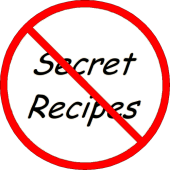A couple of weeks ago I got a comment from Dinneen, who said she liked what I was saying about eating real food. It turns out she’s been saying the same thing on her blog and with private clients ever since … well, I don’t want to tell the good part of the story. Go ahead and read her story and see if it doesn’t make you feel better about your decision to eat real food.
What You Should Eat
As a weight loss coach and mentor, people are constantly asking me what foods they should eat. They want to know exactly what to eat for breakfast, lunch, and dinner (and the snacks in-between) to help them look better, feel better, and live better. They often look for me to tell them about some “secret food” that will melt the pounds away, make them look younger, have more energy, and sleep better at night.
As I try to come up with some fancy answer, I can’t help but look them straight in the eyes and say this: Eat real foods. I then see a glazed look come over them, as they can’t believe it. “You mean THAT’S the answer?” they say. “Yes,” I tell them.
But here’s the problem: for years we’ve been told to eat the newest foods or the latest food products. The majority of the foods sold at supermarkets are not real foods. Instead, they’ve been packaged, marketed, and redesigned to look and smell like a real food, but in reality are not. The majority of them are manufactured foods.
So what’s a “real food”? Basically, a real food is one that nature gave us, something that is not processed and stripped of its nutrients and minerals. Real foods don’t come in a box and when you read the ingredients you actually KNOW what the items are.
Nobody’s Perfect
Let me say straight out that I do eat manufactured foods from time to time. The majority of the time I eat real foods (about 80-90% of the time), and the other part of my diet (10-20%) will consist of manufactured foods. This is because (a) I do like the taste of some manufactured foods (b) sometimes that’s all that is available, and (c) I don’t live on a farm.
But give me the choice between homemade lasagna, and a store-bought frozen, packaged, or ready-to-eat version, and the homemade version trumps every single time. And this goes for ANY food or meal.
But I didn’t always think this way. I didn’t always fully understand the concept of eating real foods. I thought eating real foods would make me unhealthy or gain weight.
I Believed What They Told Me
Really. Scientists, the media, diet gurus, and even the government were telling us to eat low-fat and low-calorie foods, to use margarine, and avoid high-fat (but real) foods like eggs and avocados. So instead of butter I ate margarine; instead of whole milk I drank skim or low-fat milk; instead of eggs I ate egg substitutes; instead of sugar I used artificial sweeteners.
I also avoided anything remotely guilty, like real chocolate cake, and instead opted for the lower-calorie kind with artificial sweeteners (and most times ended up eating more than I should have, as I was never fully satisfied).
Another challenge today is that we’re constantly bombarded with the newest scientific advice about what to eat. On top of that, companies are marketing to us all the time to purchase their “new and improved” packaged foods. It’s no wonder we no longer know what to eat!
So like many of you, I spent years trying to figure out what to eat. Literally. I kept looking for that newest food or product that would be the answer to my health, energy and weight-loss prayers.
I Learned Better
But then my life was turned upside-down. I went to live and work in France.
The French are known to eat wonderful foods with high levels of carbs and fats, including breads, creamy sauces, meats and cheeses. I was horrified that over time my cholesterol would sky-rocket, I would be on the road to a heart-attack, and worse I would gain weight — quelle horreur! Literally, I didn’t know how I would survive.
What do you mean you put REAL butter on the vegetables? Heavy cream in the sauce? Oh no! Real, decadent chocolate cake for dessert? How can I resist? I literally thought I was my way to an overweight, diabetic, and unhealthy life — but I couldn’t have been more wrong.
Though the French eat these foods, their obesity rate hovers around 9%, compared to the American level of 33%. And despite their daily consumption of high-fat foods, the French have one of the lowest rates of heart disease in the world, have very low rates of diabetes, and have 300% fewer heart attacks than Americans! So in addition to being slimmer, they’re healthier.
And ONE of the reasons is because they eat real foods.
This Isn’t A Theory, It’s Real Life
If you were to step into the kitchen of a typical home in France, you’d be hard pressed to find industrialized packaged food. Instead, they fill their kitchens with fresh, wholesome vegetables, fruits, dairy products, breads, herbs and spices. In their freezer you wouldn’t find many frozen dinners; instead, you’ll find they keep frozen vegetables, meats, poultry and maybe some fish in the freezer, but not many frozen dinners.
They understand that anything nature gave us is not only healthier, but also tastier and better for the body, than anything artificial. When you eat real foods, or foods with real ingredients, your body — and mind — are much more satisfied so you’re less likely to overeat.
And It Works
By adding more real foods in my diet when I lived in France, I felt better, looked better, my cholesterol levels went down, and best of all … I did not gain any weight!
When I came back to the states, I continued this path of eating mostly real foods. A few years later when I attended nutrition school, I learned more about the benefits of eating real, wholesome foods. And I have never looked back.
So if you want to know the first step to the road of a healthier, happier, and slimmer life — then start eating more real foods. It’s not some fancy answer, but it’s the honest to goodness truth, and the REAL answer of what you should eat.
© Dinneen Diette, 2009
Dinneen Diette is founder of Eat Without Guilt.com, a speaker, and contributor to various online health & wellness magazines, newsletters and websites. For more information about Dinneen, and to receive her easy tips, advice, how-to articles, and Special Report for FREE, visit www.EatWithoutGuilt.com.












